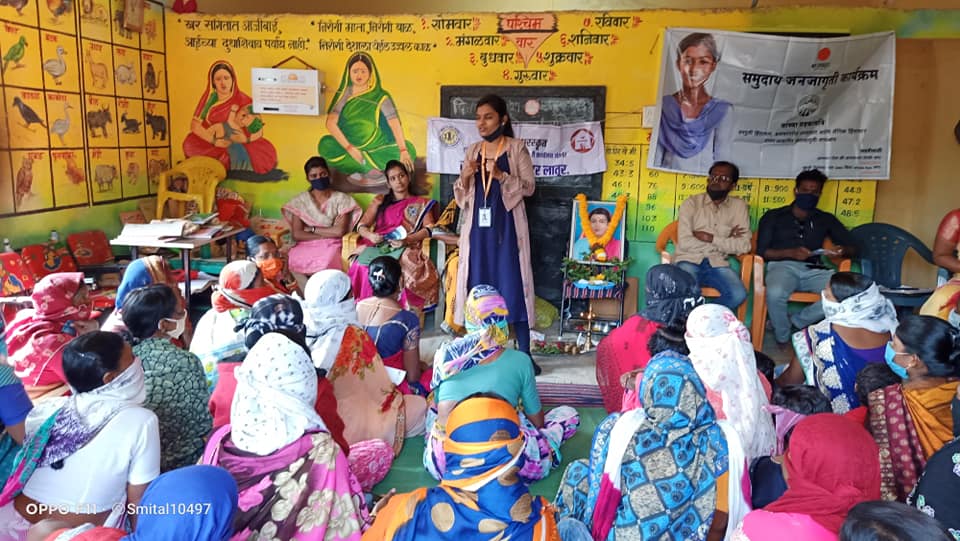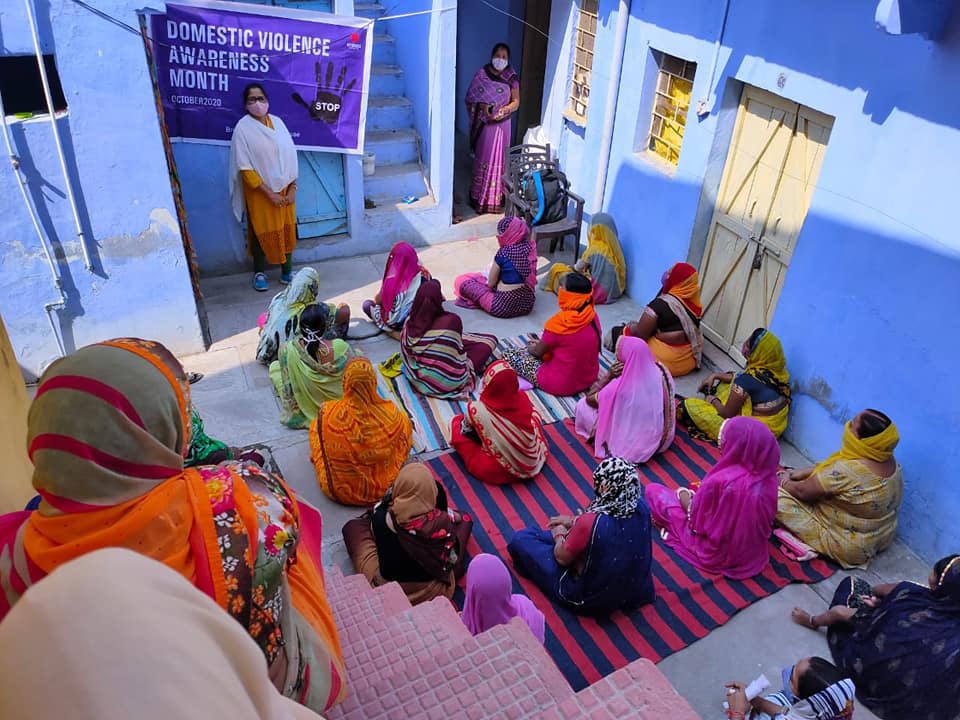A Day in the Life of India's Domestic Violence Counsellors
One in three women in India will experience gender-based violence in their lifetime. Of those women, eighty-six percent will not seek help. For those who do courageously reach out, our program partner My Choices Foundation is there.
Providing legal support, emergency accommodation and counselling around the clock, demand has only risen for these services during COVID-19. The Indian National Commission for Women finding that during the March to May lockdown of last year, more complaints to authorities were received in those sixty-eight days than in the past ten years.
Kavitha Krishnaraj, Senior Counsellor at Operation PeaceMaker, is determined to change these statistics. It is an honour to share a day in the life of Kavitha, following her work to intercede on behalf of women in communities across India, bringing safety and justice. Her courage and determination to defend the vulnerable is one story of many, showing the commitment of our partners in the countries we serve.
.jpg)
Kavitha Krishnaraj has been counselling women and their families since 2016, inspired by her own lifechanging experience with a counsellor. Image courtesy of My Choices Foundation.
Through My Choices Foundation, Operation PeaceMaker offers a resource rich, safe space for survivors of violence and their families. Services include legal assistance, safe houses, and counselling centres that provide 24/7 assistance through their helpline, including for family members, and those who are perpetrating violence. In India, where one in three women experience domestic and family violence, these troubling statistics have only risen due to lockdowns and COVID-19.
“It is 6am, Tuesday morning 12 January and we are nearly 365 days in the global pandemic.
The pandemic has made me remember a lot of my Grandma’s rules and rituals. She used to say, “remember to washyour hands and feet before you enter the house Kavitha, do not eat food from the street!” I wonder what she would have told us now? No need to remind us to wash our hands, that is all that we do to prevent contracting the virus! We have also been wearing masks for more than a year now, especially as we are in close proximity with our clients during our counselling sessions. Musings about my grandmother never escape my thoughts and today is no different.
After some refreshing chai, I feel ready for the day. My sanitiser is packed, my mask is on and I am ready for meeting with women who have bravely come forward, some referred to us by the local women's police station.
One of these cases, I recall as I leave the house, is an extremely difficult case. The husband, who we have been desperately trying to reach for counseling is not willing to cooperate. The wife fled for her life to her parents’ house and has filed a report at the local police station in Hyderabad against her husband and in-laws. My heart aches for her as I leave the house and I wonder how our counselling sessions might look like.
Soon after arriving in our office, that same husband that filled my mind has arrived, all the way from Bangalore [about 575 kilometers] for counselling. He is with a carload of his family members, much to our surprise, and concern.
We promptly reach out to his wife to come to the centre for counselling and with both parties present, we begin. I am excited that he is here as this offers the possibility of finding a resolution between him and his wife. I work to mediate the heated arguments to protect everyone involved, as the husband is not willing to cooperate. At the end of the unexpected meeting, our client states she wants a divorce. His words: “I will think about it.””

Operation PeaceMaker empowers women in communities to speak up and train others in how to prevent domestic violence, and how to seek help. Image courtesy of My Choices Foundation.
Divorce laws in India allow for a woman to divorce her husband for acts of violence, including physical, sexual, and psychological abuse. While it is difficult across the globe for women to build a case against an abuser, with assistance from legal advocates like those at My Choices Foundation, women are able to begin the divorce process and find justice.
“By the time I end with this first unexpected meeting we receive a call from another client’s husband at 1 pm to inform us that he has a bad cough, claiming it is COVID, and that he will not arrive for the counseling session with his wife. Our client is dismayed, and concerned it is an excuse, so we plan to continue the case against him with local police.
Shortly after, this morning’s client reaches out with suspicions that her husband was wearing a recorder during our session to use the conversations later. Another addition to a police report, another reason to head to the police station.
Our clients gather so much courage and bravery to come to us, and it saddens me to think that their husbands will use anything they can to delay the legal process. There was no sign of remorse or admission on the abuser’s parts. It leaves me thinking, ‘getting justice is so difficult in a shameless world of domestic violence!’”
In response to alarmingly high rates of gender-based violence, over 470 All-Women Police Stations have been established in key regions across India. In areas where women could report to an All-Women Police Station, studies have found women are significantly more likely to report acts of gender-based violence, allowing survivors to build cases and find safety.
“I quickly sanitise my hands and in doing so I am reminded that survivors of domestic violence and abuse are facing not one, but two pandemics. Violence if they remain inside their homes, and COVID-19 when they step outside of their homes.

A group of women take part in an Operation PeaceMaker group session for Domestic Violence Awareness Month in October 2020. Image courtesy of My Choices Foundation.
By the time that I start writing out the reports for each client, the husband from our first client comes rushing in with his lawyer; he demands a copy of whatever I am writing. I explain I cannot provide him with the reports, they are for the police, and he raises his voice and leaves in anger.
It is lunch time. Just as we all sit together; a young girl arrives at the centre weeping. She has just escaped from her home after her husband has been abusing her daily and she has nowhere to go. We calm her down, reassure her of our help and ask her if she wants to stay in our safe home for a few days. From there, we are able to make all the necessary arrangements and begin the process of healing and justice.
Late in the day as I pack my bags, I receive a message from a client who would like to organise a call after 6pm. It has been an emotional day of supporting these courageous women, but I quickly leave work, pick up some groceries and rush back home so that I can shower and sanitise before touching anything, including my dinner, and eat before she calls.
By the time I am done sanitising everything, the client calls. She is disheartened and confused. Her husband, who is usually abusive, is being overly loving, which scares her. This seems like the calm before an abusive episode. I assure here that we are here and take her through all the emergency procedures to keep her safe, calming her down with grounding techniques.
It is well into the night as I put the phone down. I am exhausted. Once again I remember my grandparent’s words as I wish there was more I could do for our clients who suffer unbearable and life-threatening abuse; ‘Nishkama karma –we perform actions without any guarantee of fruits.’”
With your support, program partners like My Choices can expand their safety programs to protect women and girls. Please consider donating today.